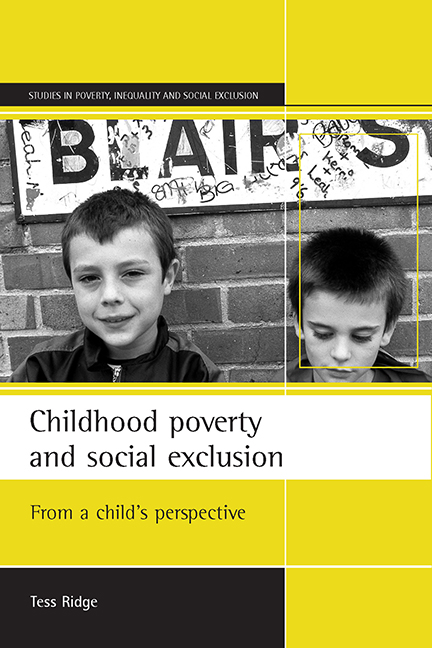Book contents
- Frontmatter
- Contents
- List of tables and figures
- Acknowledgements
- one The challenge of child poverty: developing a child-centred approach
- two What do we know about childhood poverty?
- three Children’s access to economic and material resources
- four ‘Fitting in’ and ‘joining in’: social relations and social integration
- five Family life and self-reflection
- six Experiences and perceptions of school: analysis of the BHPYS data
- seven Childhood poverty and social exclusion: incorporating children’s perspectives
- References
- Appendix BHPYS Wave 7
- Index
five - Family life and self-reflection
Published online by Cambridge University Press: 20 January 2022
- Frontmatter
- Contents
- List of tables and figures
- Acknowledgements
- one The challenge of child poverty: developing a child-centred approach
- two What do we know about childhood poverty?
- three Children’s access to economic and material resources
- four ‘Fitting in’ and ‘joining in’: social relations and social integration
- five Family life and self-reflection
- six Experiences and perceptions of school: analysis of the BHPYS data
- seven Childhood poverty and social exclusion: incorporating children’s perspectives
- References
- Appendix BHPYS Wave 7
- Index
Summary
The previous two chapters have looked at children's lives from both economic and social perspectives, and revealed the impact of poverty on each of these areas. This final chapter of qualitative findings focuses on children's home environment and their personal and familial lives. Children in general are rarely asked what their thoughts and feelings are, and the self-perceptions of children living in poverty are some of the most hidden. We have seen from the previous two chapters that inner worries, fears of social difference and stigma, and the impact of poverty on self-esteem, confidence and personal security may all exact a high price for children who are in the formative process of developing their self and social identities. Here is an opportunity to listen to children as they describe their own feelings, and the meanings they give to their experiences of poverty. They reveal their inner thoughts and fears, about their families, themselves and their futures. These are difficult areas for children to reflect on and during the interviews, when painful or difficult areas arose, great sensitivity was needed to ensure that the children felt free to pass on to other more lighthearted subjects. Sometimes this meant that children returned to these areas later, under the guise of other issues, as difficulties with friendships and worries about social acceptance can be particularly hard for children to articulate.
The chapter is in three main sections:
• Children's opportunities for play and leisure activities at home, how children use their free time and their capacity to join in shared clubs and other leisure activities with friends and peers in their neighbourhoods. Children's opportunities to experience some shared time with their parents and siblings away from home on family holidays are also addressed.
• Children's understandings and perceptions of money and need within their families. This section explores how children approach their own needs within the family, in the light of the potential conflict with their family's capacity to fulfil that need.
• Children and young people's perceptions of the impact of poverty on their lives. This section concludes with a look at what children would change in their lives if they were able to do so.
- Type
- Chapter
- Information
- Childhood Poverty and Social ExclusionFrom a Child's Perspective, pp. 85 - 110Publisher: Bristol University PressPrint publication year: 2002



